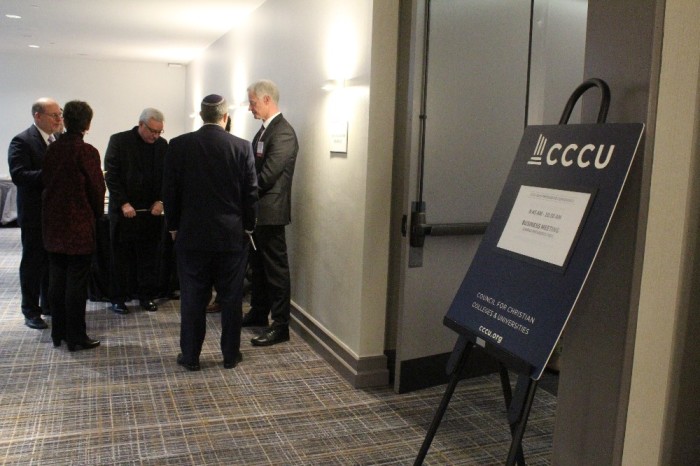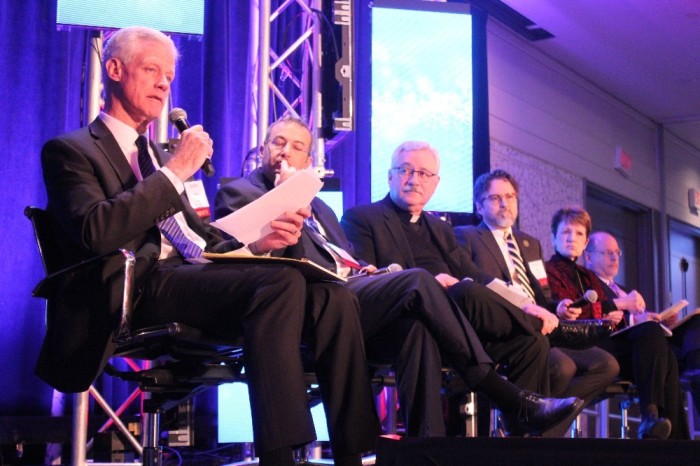Religious colleges fear higher education becoming more hostile to faith

Religious colleges are attempting to “re-write” the narrative that exists today about faith in education before societal hostility mobilizes to one day push faith-based institutions out of the “mainstream” of higher education.
Presidents from colleges representing traditions of Protestant Christianity, Islam, Catholicism, Judaism and the Church of Jesus Christ of Latter-day Saints gathered last week to discuss the challenges they face as secular society continues to grow more hostile to principles of “Abrahamic morality.”
Just days after the media hysteria surrounding second lady Karen Pence's job as an art teacher at a Christian private school in Virginia that adheres to biblical doctrine, presidents from the five religious colleges participated in a discussion just a few miles down the road in Washington, D.C., about the misunderstandings people have about faith in higher education.
The discussion capped off the Council for Christian Colleges and Universities’ Presidents Conference that took place at the Washington Court Hotel on Capitol Hill. CCCU is a network of over 180 Christian colleges worldwide.
"Today’s discussion invites us to reimagine this narrative that [characterizes] so much of the modern period and to rewrite this story going forward, to rewrite this story that persists so much in the world of higher education," Shirley Mullen, the president of Houghton College, a Christian liberal arts school in Western New York, said during the panel.
“This standard western narrative of progress has assumed that deeply-held religious beliefs, especially when there is diversity in those beliefs, result in intolerance, conflict, violence, oppression."
Mullen, who serves as vice chair of CCCU’s board of directors, contended that a “new narrative” must be crafted regarding the relationship between religion, society, higher education and human flourishing.
“One of the great misperceptions out there today, particularly within higher education, is that our institutions would be the ones that are very monolithic internally and that students come here to learn how to think like Muslims or think like Roman Catholics or whatever,” Mullen said.
“In fact, what you have heard illustrated here today is that these are the institutions where it is often really tough-minded, thoughtful dialogue going on among our students,” she continued. “[Those conversations] are passionate and they are deep because they are grounded in those fundamental moral and theological commitments.”
As a historian, Mullen stressed that people don’t realize that “science actually grew up in the context of a religious framework that assumed a universal order that the world was a creation of a rational being.” She added that faith has also been the motivation for various social reform movements and the expansion of human rights in the modern period.
John Fitzgibbons, president of the Jesuit-aligned Regis University in Colorado, suggested that students at religious colleges are able to have a dialogue on their campuses about controversial topics of the day. But on many secular college campuses, people who advocate certain religious views on topics like sexuality and marriage might find themselves shut out from the conversation.
Instead of safe spaces, Fitzgibbons argued that colleges really need “sacred spaces.”
“The university is the place where the consummately personal and the structural are examined together. It is an enormous mistake to excise or cutout faith from public conversation,” Fitzgibbons said. “It is simply misguided. It doesn’t matter what the faith articulation is. ... The point is if you don’t bring the deepest parts of your being to the conversation with others that is rigorous, challenging and profoundly difficult, the deepest part of what it means to be human is not in the conversation.”
Hamza Yusuf, co-founder of Zaytuna College, the first accredited Muslim college in the U.S., said that there is increasing hostility toward deeply-held religious beliefs at many secular colleges.
“Where I am up on Holy Hill [in Berkely, California], the most intolerant college is up there [University of California, Berkeley] and is the one that claims to be the most tolerant,” Yusuf said. “Because if you are not completely on board with all of their beliefs, then you are unacceptable, you are a bigot. I am just saying … that I don’t want to see any persecution but I also feel that we should not be persecuted for adhering to Abrahamic morality. It is just not really fair.”

During a press lunch following the panel, the presidents expressed their concerns with proposed changes to standards for accreditation issued by one of the nation’s regional college accrediting agencies, Higher Learning Commission, which oversees 1,300 post-secondary schools in the central U.S.
Last year, the HLC issued a draft rule proposal that removed language that instructed accreditors to take into account an institution’s “specific and diverse” mission when assessing a school’s commitment to diversity. The rule drew concerns from leaders within Christian higher education who fear that policies reflecting traditional Christian belief in marriage and sexuality could be questioned.
They fear that such a rule would give the accrediting body the ability to decide whether a school “ensures inclusive and equitable treatment of diverse populations.”
As a number of Christian schools have statements of faith that oppose homosexuality, the fear is that the accrediting agency wields power to impact an institution’s abilities to receive federal student loans and federal grants if they are noncompliant.
“It is noteworthy that this is really a plea for diversity from a group of universities that are sometimes viewed as not very tolerant in their viewpoint,” Kevin Worthen, president of Brigham Young University in Utah, explained.
One reporter pushed back during the conversation and noted that the HLC rule proposal being objected to by religious schools is supposed to ensure the inclusivity in the viewpoint of the colleges. The reporter asked if the universities simply don’t want to be “forced to accept diversity.”
“There is one way in which you say everyone will be diverse in exactly the same way,” Worthen replied.
Mullen agreed.
“There is some tension between that and sort of institutional diversity that comes as a seedbed for ultimate diversity,” Mullen said. “There is some tension there. That is a very good point.”
Yusuf weighed in and said that if religious colleges are supposed to take their religious traditions seriously, then the demand that they “abandon a set of core principles of the religions for the zeitgeist” is not fair.
One reporter brought up the public outrage surrounding Karen Pence’s decision to teach at a Christian school in Northern Virginia that has clearly outlined beliefs opposing homosexuality.
“It is interesting that someone mentioned earlier that she was out of step with 67 percent of the country,” Yusuf said. “So suddenly morality is determined by a poll? … That is like saying that Abraham Lincoln is out of touch with reality because 67 percent of Americans are pro-slavery. It is a little crazy.”
Yusuf said that in the future, he can see things “getting much worse and difficult” for Christian, Orthodox Jewish and Muslim colleges “to adhere to basic Abrahamic morality without being considered bigots or preaching hate or something like that.”
While religious colleges are guaranteed the freedom to hold religious beliefs by the U.S. Constitution, one reporter asserted that the Constitution doesn’t guarantee religious colleges federal funding.
Mullen responded by stating that it has always been understood that federal dollars are tied to individual students who have the freedom to choose where they spend those federal dollars.
“There are still many, many students in this society that want to choose an education that accords with their fundamental moral and spiritual roots,” Mullen explained. “No students arrive at one of our institutions not knowing what they are getting into. They are choosing to go to those institutions because of the values of those institutions. … I believe there is also a social good in American society for these institutions to remain places that these students can spend that money.”
Mullen believes that civil society would be “worse off” if religious colleges were not granted access to federal funding.
“Most of these institutions are going to turn out people of faith who have thought much more deeply about the links between reason and faith than most of the people in American society,” Mullen stressed. “These graduates can be the bridge builder in a society that has many people who have nothing to do with religion and people of faith. The larger culture would be worse off if federal dollars cannot continue to support the branch of higher education which is doing the most to produce people who understand [how to speak across the religious and political spectrum].”
Mullen asserted that religious colleges are committed to being “within the mainstream of American higher education.”
“That is really what we are arguing for right now is the right to remain within the mainstream of higher education rather than be segregated off,” she concluded.
Follow Samuel Smith on Twitter: @IamSamSmith
or Facebook: SamuelSmithCP




























